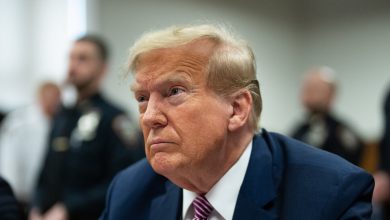What Donald Trump and Reality Winner Have in Common

Donald Trump is facing a 37-count indictment in federal court on charges connected to his retention of classified documents at his Mar-a-Lago estate in Florida. The charges include 31 counts of violating the Espionage Act for willfully retaining, without authorization, documents relating to national defense. As a former president with no formal security clearances, Mr. Trump no longer had a legal right to even view the documents, much less keep them.
According to the indictment, the items included top secret documents detailing the military capabilities of foreign countries and the “military activities and planning” of several foreign countries. The documents also described “nuclear capabilities of a foreign country,” “military contingency planning of the United States,” “military options of a foreign country and potential effects on United States interests,” “military operations against United States forces” and information concerning “nuclear weaponry of the United States.” The information is of concern to at least seven national security agencies, including the Central Intelligence Agency, the Department of Defense and the National Security Agency.
An ordinary person facing these charges would almost certainly enter a plea deal and spend years in prison, but Mr. Trump is far from ordinary. With Mr. Trump now the leading contender for the Republican nomination, his lawyers will probably attempt to delay the trial until after the 2024 presidential election. If he becomes the G.O.P. nominee and then wins the presidency, it is likely that the case will be put on hold while he serves, as executive branch precedent holds that a sitting president cannot be criminally prosecuted. Even so, the indictment is a step toward holding him to account for putting U.S. national security at terrible risk. His own Justice Department vigorously enforced the Espionage Act, sending people to prison for much less than the actions described in the indictment of Mr. Trump.
Perhaps the most famous defendant sent to prison by federal prosecutors with violating the Espionage Act while Mr. Trump was president is Reality Winner, an Air Force veteran who was working for a military contractor when, not long after Mr. Trump became president, she printed out a single classified document, took it home and mailed it to the news website The Intercept. The report, which was classified top secret, stated that Russian hackers had gained access to voter registration rolls during the 2016 election. She was charged by federal prosecutors with a violation of the Espionage Act and, after pleading guilty to a single count of unauthorized transmission of national defense information, was sentenced to 63 months in prison.
Nghia Pho, who worked for the National Security Agency’s hacking unit, was also sent to prison while Mr. Trump was president for violating the Espionage Act. Mr. Pho faced charges for taking classified documents to his Maryland home in order to get extra work done at night and on weekends in hopes of improving his performance evaluations. This came to light after the information was believed to have been stolen by Russian hackers using the antivirus software on his computer. He pleaded guilty to a single count of willful retention of national defense information and, like Ms. Winner, was sentenced to more than five years in prison.
Then there’s Julian Assange, the eccentric founder of WikiLeaks. He was initially charged by U.S. federal prosecutors for several counts of conspiracy to commit computer intrusion. This was for the unauthorized disclosure of a trove of classified documents that he received from Chelsea Manning, an Army intelligence analyst, and posted on his website. A superseding indictment charged Mr. Assange with several counts in violation of the Espionage Act, including section 793(e), the same provision under which Mr. Trump has been charged. News outlets roundly criticized the Assange indictment as a threat to the First Amendment, since his actions were consistent with common reporting practices, albeit on a much larger scale. He remains in prison in London and is facing imminent extradition to the United States for trial.
The case against Mr. Trump is different from most Espionage Act cases in one respect: Most people charged under the act, including Ms. Winner and Mr. Assange, did not just retain sensitive information but also transmitted it. The indictment of Mr. Trump focuses on his retention of national security information, not his transmission of it — though in the indictment he is accused in two instances of sharing classified information with people not entitled to it. Mr. Pho never transmitted classified documents or showed them to anyone, though his decision to take them home made them vulnerable to Russian hackers. Mr. Trump, too, stored documents in almost comically insecure conditions — such as in a bathroom —but the indictment does not document unauthorized access by foreign adversaries. As a result, the potential harm done to U.S. national security is huge, but the actual damage is less clear.
Also unclear is why Mr. Trump went to all this trouble to keep so many classified documents heknew he was not permitted to have. Did he intend to sell them? Use them for some other personal advantage? Did he just want to keep them to impress his friends and associates by flashing the government’s most closely guarded secrets? A tape of Mr. Trump bragging about his secret documents calls to mind Jack Teixeira, a 21-year-old Massachusetts Air National Guardsman who apparently posted hundreds of top secret Pentagon documents on social media to impress his fellow gamers — and who almost certainly will spend much of the rest of his life in prison as a result.
Mr. Trump and his defenders argue that the indictment against him is politically motivated. They argue that he is being prosecuted for retaining classified government documents even though President Biden and Vice President Mike Pence also were found to have some classified documents in their possession after they left office. In Mr. Biden’s case, his personal attorneys came across classified documents from his time as vice president in a locked closet in his office at the Penn Biden Center. After additional searches, more documents were found in his Wilmington, Del., home. Mr. Pence’s personal lawyers found classified documents in his Indiana home; a search by the F.B.I. turned up additional documents with classification markings.
The key difference between the legal situations of Mr. Biden and Mr. Pence and that of Mr. Trump is not politics. Rather, the difference lies in what they did once they discovered the classified materials: Mr. Biden and Mr. Pence immediately notified the federal government, turned over the documents, and fully consented to thorough F.B.I. searches of their personal offices and residences. They did not willfully retain documents that they knew they had no legal right to keep, and they certainly did not undertake elaborate schemes to mislead their own lawyers or the government in order to conceal and hold the documents. The special counsel working on Mr. Biden’s case has not yet announced whether he will pursue charges, but the Justice Department has closed the case against Mr. Pence, announcing just days before the Trump indictment was filed that no criminal charges will be sought.
What about Hillary Clinton? Mrs. Clinton was the subject of chants at Trump rallies during the 2016 presidential campaign after it came to light that she had sent and received classified information on a private email server while serving as secretary of state. Unlike Mr. Trump, Mrs. Clinton had the right to see the documents in question; she was in office at the time and was cleared to see the most sensitive classified materials. The concern instead was that she had made classified information vulnerable by sharing it over an unclassified server and then deleted thousands of emails in what some saw as an attempted cover-up.
An F.B.I. investigation found that out of 30,000 emails sent to the State Department, 110 emails in 52 email chains contained classified information. Eight of the chains contained information at the top secret level. But only “a very small number” of the emails contained classification markings that would have signaled the presence of classified information. Announcing that no charges would be brought, James Comey, the F.B.I. director at the time, stated that Mrs. Clinton and her colleagues were “extremely careless” in handling classified information but that the F.B.I. had not found clear evidence that she “intended to violate laws governing the handling of classified information.” Not only is Mr. Trump on tape discussing a classified document he knew he had no legal right to possess, but he also repeatedly attempted to play a shell game with classified documents to keep them out of the government’s hands.
Unless Mr. Trump pleads guilty (which seems very unlikely), it will be up to a jury to determine his guilt. But the picture that emerges from the indictment is of a man who never really took seriously the responsibility he had as president to preserve and defend the national security of the United States. When he was president, it was reported that he rarely read his daily brief, yet the indictment reveals that once out of office, he hoarded some of our country’s most important national secrets, trotting them out on occasion as if they were party tricks.
Those who are describing this indictment as Gov. Ron DeSantis of Florida did, as “the weaponization of federal law enforcement,” misunderstand the situation that Jack Smith, the special counsel who was appointed to investigate the case, faced. Those who say Mr. Trump should have been allowed to get away with putting U.S. national security at risk have claimed that he is not receiving equal treatment under the law. But that is, in fact, what Mr. Trump is getting.
Oona A. Hathaway is a professor of law and political science at Yale University and former special counsel to the general counsel at the U.S. Department of Defense.
The Times is committed to publishing a diversity of letters to the editor. We’d like to hear what you think about this or any of our articles. Here are some tips. And here’s our email: [email protected].
Follow The New York Times Opinion section on Facebook, Twitter (@NYTopinion) and Instagram.




